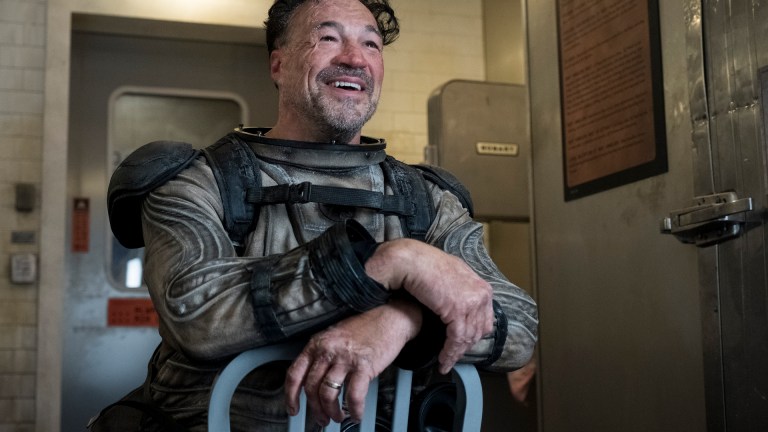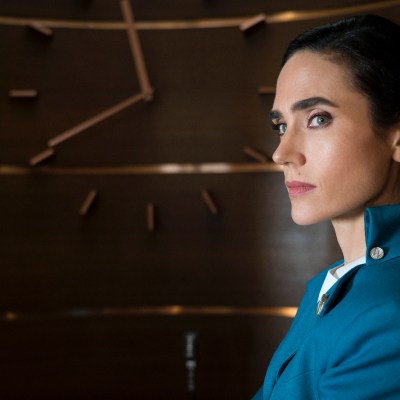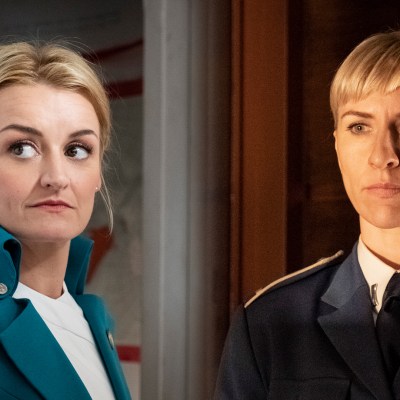Snowpiercer Episode 2 Review: Prepare to Brace
On Snowpiercer, the thin line between life and death is a window, holding back the killing cold of the outside world.

This Snowpiercer review contains spoilers.
Snowpiercer Episode 2
In the first episode of Snowpiercer, an off-handed comment was made about a particular smoked salmon sushi roll. The problem wasn’t with no more salmon, the problem was no more wood chips for the smoker. Both Susan Park’s Jinju and Jennifer Connelly’s Melanie laugh that off, but it’s a sign that should be familiar to people currently weathering resource scarcity during lock down.
With COVID-19, it’s a problem with the supply chain. We have food and paper mills and whatnot, but the processing shift from commercial demand to consumer demand isn’t easy, especially given consumer preferences for pretty produce and two-ply toilet paper that doesn’t come in 20-pound rolls. Product is there, but transportation and processing for consumer use isn’t. On Snowpiercer, the supply chain is efficiently waiting, but the product itself may not always be there, particularly after a broken window leads to what Melanie refers to seriously as an extinction event.
The key element, of course, is the first class passengers. They’re the wealthiest ones, the ones whose largess paid for the very train that keeps them all alive, so they must be kept happy no matter what. Second class passengers are also catered to, but not to the extent of coffee out of fine china. Third class are barely better than the tailies, used for crucial maintenance and allowed to breed, if they’re the right sort of third class passengers. When the snake starves, it starves from the tail up, and so goes the resource cuts to the passengers of Snowpiercer, with the train’s rolling blackouts coming for third and tail passengers, and the train’s first class passengers barely noticing the train’s lowered resources and reduced speed as track conditions damage the train.
It’s a precarious thing, the train in Snowpiercer. Having ridden the subways in New York, I can safely say that there are a lot of things that can go wrong on a train, particularly one that’s in perpetual motion with absolutely no downtime and limited ability to slow down without sacrificing luxuries. Those luxuries mean a lot, particularly on a train with as active of a rumor mill. One of the big reveals is that Wilford has moles in the third class compartment, but apparently, everyone in first class has some sort of mole, too. Rumors spread quickly, from the uprising in the tail to the two murders in third class. No doubt, the higher-ups like Lilah Folger (Kerry O’Malley) have a different sort of survival skills than those people in the tail, or even third class laborers, ones that require them to have ears to the ground and parse rumor from reality.
Even before the window shatters in the cattle car, Snowpiercer is headed for trouble. Traveling through the mountainous Canadian wilderness, hacked Russian satellites offer little help for guiding the train, and in the wake of the high-speed train’s passing, avalanches tumble across the tracks. Given the choice between reducing speed and cutting power, Melanie chooses to keep the speed going, because, while people like breech worker Bojan Boscovic (Aleks Paunovic) might be able to face a little cold outside the train, and the tailies are very used to surviving off remains and rations, the train itself might not be able to afford to tap into battery reserves. Batteries keep the train running, supply power to food and water services, and even a small dip in power availability means choices have to be made—turn off the water system and survive off hoarded rations and what’s in the tanks, skip crop rotations, or roll blackouts for the poor.
Every option has a risk. Skipping crop rotation is usually a bad idea, because those crops are needed to feed the train and could throw off the delicate balance of the soil. Water rationing for second class and below passengers won’t quell the growing class divisions. Rolling blackouts turn sketchy places, like the third class sleeping cars, dangerous. There have already been murders plural there, and Layton (Daveed Diggs) and Till (Mickey Sumner) are no closer to catching the actual culprits than Till was years ago when Nikki Genet was first put into the Drawers, though they have a little more clues to chase this time around.
Layton won’t take the easy way out and blame the murder on the now-frozen butchers; that’d be the easy way out and a ticket to a cushy job in third class as the train detective working alongside the brakemen and jackboots. Donald Joh’s script does a solid job of establishing Layton’s force of character; he’s willing to take any kind of beating and undergo any sort of humiliation not to better himself, but to better the station for everyone in the tail. Others might take the chance to get out of the tail and run with it, but Layton has to do it the hard way, even when Till gives him some very good advice to blame someone and take the deal that Melanie offered him on behalf of Wilford and the train. Joh also does a solid job of emphasizing the class differences between passengers, and the thin edge upon which the train, and the survival of the human species, rides on.
All it took was a crack in the window to eliminate beef from the menu permanently. Sam Miller does an efficient job establishing Audrey’s cabaret in the night car (powered by the beautiful singing voice of Lena Hall) and the sort of work people do in the car in order to stay in something resembling good mental health. Miller also does a great job with both the scene in which the punishment is doled out for the tailie rebellion and the same killing cold breaking into the train to freeze the beef supply and several butchers alive in moments. It’s a simple, but effective pair of scenes, highlighted mostly by the shattering of the frozen solid arm of the tailie mother with the tap of a hammer (think that great frozen head smashing from Jason X, but not played for laughs). Not that she, or her child, or the two dozen people who died in the raid really matter.
The people are replaceable, but the cows – their meat, milk, methane, and manure – are all crucial ingredients in keeping people alive (and happy) across all 1,001 cars of the train. If an interruption in electricity is bad, no more methane power and manure in which to grow crops is worse than any dismembered corpse or tailie riot. Shortages have now turned into outages, and if people were grumpy about no smoked salmon, they’ll be apoplectic without rare T-bone steaks and milk for cereal.


